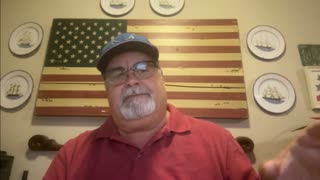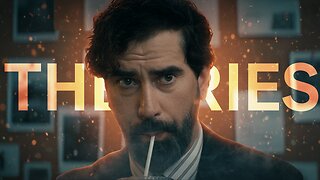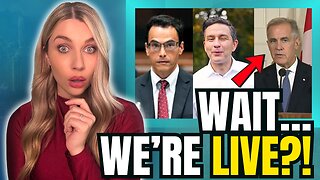Premium Only Content

Truth Of Charlie Kirk
The Truth of Charlie Kirk: Unmasking the Firebrand Who Shaped—and Divided—a GenerationIntroduction: A Bullet's Echo in the Heart of American DivisionOn September 10, 2025, at 2:23 p.m. Eastern Time, the crack of a single gunshot shattered the air on the sun-baked campus of Utah Valley University in Orem, Utah.
Charlie Kirk, the 31-year-old firebrand of American conservatism, was mid-sentence—debating the thorny issue of mass shootings committed by transgender individuals—when a bullet from a rooftop sniper's perch ended his life.
The event was the kickoff of his "American Comeback Tour," a high-energy series of campus rallies designed to rally young conservatives against what he called the "woke indoctrination" of higher education.
Video footage, captured by students and quickly viral on platforms like X and TikTok, shows Kirk clutching his chest, his trademark confident smirk twisting into shock as he collapsed amid screams from the crowd.
Within hours, President Donald Trump confirmed the news on Truth Social, hailing Kirk as a "legendary warrior" who "understood the heart of the youth in the United States of America better than anyone."
Flags flew at half-staff across federal buildings, and Trump announced that Kirk would receive the Presidential Medal of Freedom posthumously—a rare honor for a non-officeholder.
But the truth of Charlie Kirk is far more layered than the hagiography poured forth in those initial tributes. Kirk was not just a victim of political violence; he was its amplifier, a provocateur whose rhetoric often danced on the edge of incitement, blending sharp wit with inflammatory zeal.
His assassination, carried out by 22-year-old Tyler Robinson—a lone gunman with no formal ties to left-wing groups, driven by what prosecutors described as revulsion at Kirk's "hatred" toward LGBTQ+ communities—ignited a firestorm of conspiracy theories, retaliatory firings, and soul-searching about America's deepening divides.
2 sources
Robinson, arrested hours later after a manhunt, left a note for his roommate confessing, "I had the opportunity to take out Charlie Kirk and I’m going to take it," adding, "Some hate can’t be negotiated out."
No manifesto surfaced, but family members recalled Robinson's fury at Kirk's anti-trans rhetoric, including calls for "Nuremberg-style trials" for gender-affirming care providers.
This video delves into the unvarnished truth of Charlie Kirk: the suburban kid who built a conservative empire from a basement, the media savant who mobilized millions of young voters for Trump, and the divisive ideologue whose words on race, gender, and faith fueled both adoration and outrage. Drawing from court documents, eyewitness accounts, and a deep dive into his career, we explore how Kirk's life—and death—exposes the raw underbelly of American political extremism. Was he a patriot awakening a sleeping generation, or a demagogue sowing seeds of hatred? The evidence suggests both, and neither—a mirror to our fractured nation. As Vice President JD Vance tearfully eulogized at Kirk's Glendale memorial, attended by 60,000, "Charlie didn't just help us win in 2024; he helped us staff the entire government."
Yet, in the weeks since, over 145 people—teachers, journalists, even college students—have been fired or disciplined for posts "celebrating" his death, a chilling wave of reprisal that Vance himself urged on Kirk's podcast.
2 sources
This is the truth of Charlie Kirk: a life that ignited a movement, and a death that deepened the chasm.Early Life: From Eagle Scout to Reagan Reverie—A Foundation of Suburban ConservatismCharles James Kirk entered the world on October 14, 1993, in the leafy, middle-class enclave of Arlington Heights, Illinois—a Chicago suburb where manicured lawns and minivans symbolized the aspirational American dream.
As the only son of Robert W. Kirk, an architect whose firm contributed to high-profile projects like Trump Tower in New York, and Kathryn (née Smith), a former commodities trader turned mental health counselor, young Charlie grew up in a household of moderate Republican values tempered by pragmatism.
The family later moved to Prospect Heights, into a spacious five-bedroom home that became a hub for political dinner-table debates, often circling back to Ronald Reagan's anti-communist fervor and the virtues of free markets.
Kirk had a younger sister, Mary, now an art curator in Chicago, but it was the absence of siblings that perhaps honed his solo spotlight-seeking tendencies early on.
Raised in the Presbyterian tradition, Kirk attended church sporadically, but faith was more cultural than fervent at first—family prayers emphasized personal responsibility over fiery evangelism.
An Eagle Scout who earned his badge through community service projects, Kirk embodied the self-reliant ethos of his youth group, organizing fundraisers for local charities while devouring books by Milton Friedman and Ayn Rand.
"I became Reagan's 10-year-old boy in 2008," Kirk later reflected in a high school essay, captivated by the Gipper's optimism amid Barack Obama's election.
This was no abstract admiration; by middle school, Kirk was tuning into Rush Limbaugh's radio rants, scribbling notes on "liberal media bias" and the "evils of socialism."
Wheeling High School proved a crucible for Kirk's budding activism. Classmates recall him as "rude" and "arrogant," a straight-A student who clashed with teachers over what he deemed "indoctrination."
In junior year, he penned an op-ed for Breitbart News at 17, blasting high school economics textbooks for glorifying liberal economists like Paul Krugman while sidelining free-market heroes.
The piece landed him on Fox Business, a thrill that lit the fuse. "This is what I was born for," he told his parents, eyes alight.
Kirk volunteered for Sen. Mark Kirk's (R-IL) 2010 reelection, knocking doors in blustery Chicago winters and honing a persuasive patter that mixed folksy charm with sharp jabs.A lighter anecdote from sophomore year reveals the seeds of his organizational genius: the "cookie crusade." Outraged by vending machines charging $2 for a single Oreo pack—"highway robbery!"—Kirk rallied classmates, petitioned the principal, and secured a price cut.
It was micro-activism, but it foreshadowed his knack for turning grievances into movements. Accepted to West Point and Harper College, Kirk enrolled at the latter in 2011 but dropped out after one semester. "College was indoctrination central," he later quipped on his podcast, opting for the real-world battlefield of politics.
This bold pivot at 18, eschewing a degree for destiny, marked the truth of early Kirk: a restless idealist, fueled by conviction over credentials, already sensing his path lay in disrupting the status quo.The Basement Birth of an Empire: Founding Turning Point USA and Early TriumphsMay 2012: A nondescript basement in suburban Chicago. Charlie Kirk, fresh-faced and fueled by Red Bull, pitches his vision to Bill Montgomery, a 71-year-old Tea Party stalwart and retired marketing exec.
Kirk had just delivered a fiery Youth Government Day speech at Benedictine University, railing against Obama's "socialist agenda." Montgomery, mesmerized, handed over $5,000 seed money: "Kid, you've got fire. Skip college—build something."
Thus, Turning Point USA (TPUSA) was born, a nonprofit aimed at countering liberal dominance on campuses with "fiscal responsibility, free markets, and limited government."
From those humble origins, Kirk's alchemy turned audacity into ascent. TPUSA's "Prove Me Wrong" tables—pop-up debate spots where Kirk would grill passersby on hot-button issues—became viral goldmines. Clips of him dismantling "snowflakes" on abortion or gun rights racked up millions of views, blending Socratic sparring with gotcha journalism.
Early funding from donors like Foster Friess, a Christian conservative billionaire, fueled expansion: one chapter in 2012 ballooned to dozens by 2014.
Kirk's charisma was the secret sauce—"No money, no connections, no idea what I was doing," he admitted in a 2020 interview, yet his ability to "lean into cultural tensions" amid rising campus progressivism resonated.
By 2015, TPUSA launched the infamous "Professor Watchlist," a crowdsourced database flagging "leftist indoctrinators" in academia—500,000 views in weeks, but slammed as McCarthyite vigilantism by the ACLU.
Kirk defended it as "accountability," but critics saw the seeds of his truth: a willingness to weaponize outrage for growth. Compensation started modest—$27,000 in 2016—but skyrocketed as TPUSA became the GOP's youth arm, displacing rivals like Young America's Foundation.
The 2016 election was Kirk's breakout. At 22, he was among the youngest speakers at the Republican National Convention, thundering, "We must occupy every mountain—politics, media, education!"—echoing the Seven Mountains Mandate of Christian dominionism.
His early Trump endorsement, defying establishment skeptics, forged ironclad alliances. Donald Trump Jr. became a confidant; Kirk's network even introduced JD Vance to the Trumps, catapulting Vance toward the vice presidency.
Post-election, TPUSA's "Debt Clock" tours and anti-DEI campaigns solidified Kirk as conservatism's millennial messiah, with chapters on 3,500 campuses and 250,000 members by 2025.
Yet, this era revealed Kirk's dual truth: builder and bulldozer. His 2017 book Time to Stand Up urged youth rebellion against "cultural Marxism," selling briskly but drawing fire for oversimplifying complex ideologies.
Forbes named him to its "30 Under 30" list in 2018 for Law & Policy, praising his mobilization of 100,000 students.
But whispers of controversy simmered—TPUSA's rapid growth masked internal frictions, like the 2017 resignation of national director Crystal Clanton over racist texts ("I hate black people"). Kirk initially defended her—"America needs more Crystals"—before cutting ties, a pattern of loyalty tested by scandal.
The truth? Kirk's empire was built on bold strokes, but cracks formed early, foreshadowing the tempests ahead.The MAGA Maestro: Media Empire, Trump Alliance, and Cultural ConquestThe 2020s crowned Kirk as conservatism's multimedia mogul. In 2019, The Charlie Kirk Show debuted on Salem Radio, a three-hour daily blitz blending monologues, guest rants, and caller takedowns—topping Apple Podcasts with 500,000–750,000 downloads by 2024.
Syndicated nationwide, it amassed 5 million X followers and 7 million on TikTok, where "Surrounded" videos—Kirk vs. 20 "woke" students—garnered billions of views.
"He's got this army of young people," Trump gushed at a 2024 Turning Point Action Conference. "These are young patriots."
Kirk's Trump symbiosis deepened. Turning Point Action, TPUSA's advocacy arm, funneled millions into 2020 voter turnout, busing 350 students to D.C. on January 5, 2021—Kirk tweeted "500 emails a minute calling for civil war" amid election denialism.
Books like The MAGA Doctrine (2020) codified Trump's worldview, becoming NYT bestsellers and netting Kirk royalties atop his $407,000 TPUSA salary.
By 2021, TPUSA Faith mobilized evangelicals, partnering with churches for "reclaim the country for Christ" conferences.
The 2023 BLEXIT collaboration with Candace Owens targeted Black conservatives, though critics decried it as performative.
Achievements piled high: AmericaFest, TPUSA's annual spectacle, drew 20,000 with Trump speeches, Kid Rock anthems, and pyrotechnics—chants of "Christ is King!" echoing Kirk's fusion of faith and populism.
The 2024 "You're Being Brainwashed" tour hit 25 campuses, generating two billion social media impressions and flipping Arizona red by 5 points via Gen Z turnout.
Kirk launched careers—Vance, Pete Hegseth—and staffed Trump's administration, earning a March 2025 appointment to the U.S. Air Force Academy Board.
In February 2025, he inked a Trinity Broadcasting Network deal for Charlie Kirk Today, a weekday talk show blending policy and prophecy.
But the truth cuts deeper: Kirk's conquests came at a cost. His 2024 RNC speech warned Gen Z of Democratic "brainwashing," but offstage, he mused on violence's justification against opponents—a 2021 audience question he dodged with, "That's above my pay grade."
Financially, Kirk thrived—a $4.75 million Arizona mansion, Florida beach condo, speaking fees—but TPUSA's $43 million 2020 war chest raised grift allegations.
The maestro's baton conducted harmony for the right, discord for the rest.The Dark Side: Controversies, Hate Speech, and the Rhetoric of DivisionKirk's truth is inseparable from his tempests. Critics branded him a "grifter peddling hate," citing a litany of inflammatory statements that skirted—and sometimes crossed—into bigotry.
On race, he called George Floyd a "scumbag" in 2021, deeming his death unworthy of focus.
In 2023, he trashed Martin Luther King Jr. as "awful" and the Civil Rights Act a "huge mistake," birthing "DEI bureaucracy."
The Great Replacement theory was a staple—2024 warnings of "prowling Blacks" and immigrant "threats" to "white demographics."
His "Exposing Critical Racism Tour" assailed CRT as "anti-white propaganda," while blaming Black gun violence on "lack of fathers."
Gender wars raged fiercer. By 2022, Kirk dubbed LGBTQ+ activists the "alphabet mafia," advocating a nationwide gender-care ban and "Nuremberg trials" for doctors in 2024.
"A throbbing middle finger to God," he called trans care in 2023; he urged women to shun careers for "marriage and motherhood."
Mocking Taylor Swift as a "witch" swaying votes in 2024, Kirk's barbs drew Southern Poverty Law Center tracking for white nationalist ties, including invites to Nick Fuentes.
COVID misinformation flowed freely: false hydroxychloroquine endorsements, "China virus" labels, vaccine skepticism.
Election denialism peaked with January 6 bus trips; antisemitism whispers emerged from "Jewish donors" funding "Marxism" claims in 2023, clashing with pro-Israel stances.
Bans from campuses like University of Chicago in 2018 for "safety" burnished his martyr badge.
The truth? Kirk's words were weapons—witty, viral, but laced with venom that radicalized youth while alienating millions. As NPR dubbed him "the most influential voice in young conservatism," the cost was a polarized polity, where debate devolved into demonization.
Personal Life: Faith, Family, and the Facade of the Family ManBehind the bombast, Kirk was a devoted patriarch. He met Erika Frantzve, 2012 Miss Arizona USA and podcaster, in 2018; their 2021 wedding blended glamour and gospel.
Daughter Sammy arrived in August 2022, son Jack in May 2024; Instagram reels showed beach Bible studies and family hikes, Erika captioning anniversaries, "Let God write your love story."
Post-assassination, Erika vowed, "The movement will not die," assuming TPUSA CEO duties.
Faith evolved from Presbyterian roots to fervent Christian nationalism. By 2021, Kirk kept a "Jewish Sabbath" weekly, deeming it a Christian command; he advocated creationism, debunking Darwin.
"You cannot have liberty without a Christian population," he preached in 2024.
Yet, luxuries abounded—fine wines, cigars, a globe-trotting lifestyle belying his anti-elite screeds.
The truth of personal Kirk: a man who embodied his ethos—family first, faith fierce—but whose public persona often overshadowed private joys, leaving Erika and the children to inherit a legacy of light and shadow.The Assassination: Chaos, Conspiracies, and a Nation's ReckoningSeptember 10, 2025: Orem's outdoor amphitheater buzzed with 1,500 students as Kirk sparred on trans-related shootings.
From a rooftop 200 yards away, Tyler Robinson fired once—a 5.56mm round from an AR-15—striking Kirk in the chest.
Chaos erupted: screams, a frantic medic rush, Kirk's final words lost in the din.
Robinson fled but was nabbed after a tip; no left-wing links, per FBI, but texts revealed planning: "Too much evil... he spreads too much hate."
The aftermath was seismic. Trump ordered half-staff flags; Melania tweeted heartbreak.
Ron DeSantis demanded the death penalty; Stephen King decried "American gun violence."
Conspiracies bloomed: Mossad ties over Epstein jabs (debunked by Netanyahu), Antifa plots (no evidence).
Tucker Carlson faced antisemitism accusations for Jewish conspiracy hints.
Reprisals followed: 145+ firings for "celebratory" posts, urged by Vance: "Call their employer."
Polls showed Republican pessimism surging—49% saw America on the right track post-shooting, down from 70%.
UVU closed for days; Congress erupted in shouts during a Kirk silence.
The truth? Kirk's death, amid 2025's violence spree—Trump attempts, legislator shootings—highlights a nation where words wound as deeply as bullets.
As The Guardian editorialized, "Acts of political violence exact an appalling human toll... deterring civic activity."
Legacy: Martyr, Menace, or Mirror? The Enduring Truth of Charlie KirkCharlie Kirk's truth endures in paradox: a catalyst for conservative revival, architect of division. TPUSA surges post-death, chapters spiking; The Charlie Kirk Show lives on with rotating hosts.
Pastors report "faith revivals," youth recommitting to "occupy until I come."
Yet, Ilhan Omar captured the counter: "A tragedy... but no legacy to honor. Filled with bigotry."
He mobilized millions, flipped elections, fused faith and MAGA—but at what price? His rhetoric, per experts, radicalized the vulnerable, contributing to violence's tide.
As NPR reflected, Kirk was "hope for the Christian right," but a "perilous moment" per The Guardian.
2 sources
In death, Kirk mirrors America: ambitious, contentious, unyielding. From cookie crusader to MAGA maestro, he lived large, loved fiercely, divided deeply. Prove him wrong—or join the dance. The truth? It's yours to reckon.
-
 41:26
41:26
Mystery School
25 days agoLife As A Neurodivergent Trying To Figure Out What Life Is
133 -
 LIVE
LIVE
Game On!
19 hours agoFINALLY! MLB Postseason IS HERE!
4,592 watching -
 10:29
10:29
Ken LaCorte: Elephants in Rooms
17 hours ago $0.95 earnedWhy Did Britain Protect Child Molesters?
22.1K13 -
 8:19
8:19
Adam Does Movies
1 day ago $0.32 earnedOne Battle After Another - Movie Review
3.53K2 -
 39:24
39:24
NAG Daily
14 hours agoThe Rezendes Rundown Ep. 21 - National Distress
4.45K1 -
 LIVE
LIVE
BEK TV
23 hours agoTrent Loos in the Morning - 9/30/2025
158 watching -
 LIVE
LIVE
The Bubba Army
22 hours agoTrump & Netanyahu Done Deal? - Bubba the Love Sponge® Show | 9/30/25
2,311 watching -
 9:15
9:15
ThinkStory
1 day ago6 INSANE Cipher Theories!
10.5K -
 20:54
20:54
Jasmin Laine
17 hours ago"Why Are You AVOIDING Me?"—Poilievre GRILLS Carney as He CRUMBLES Under Pressure LIVE
14.4K27 -
 7:13
7:13
China Uncensored
19 hours agoChina’s Military Is Out of Control. Can This INSANE Plan Stop It?
11.1K13